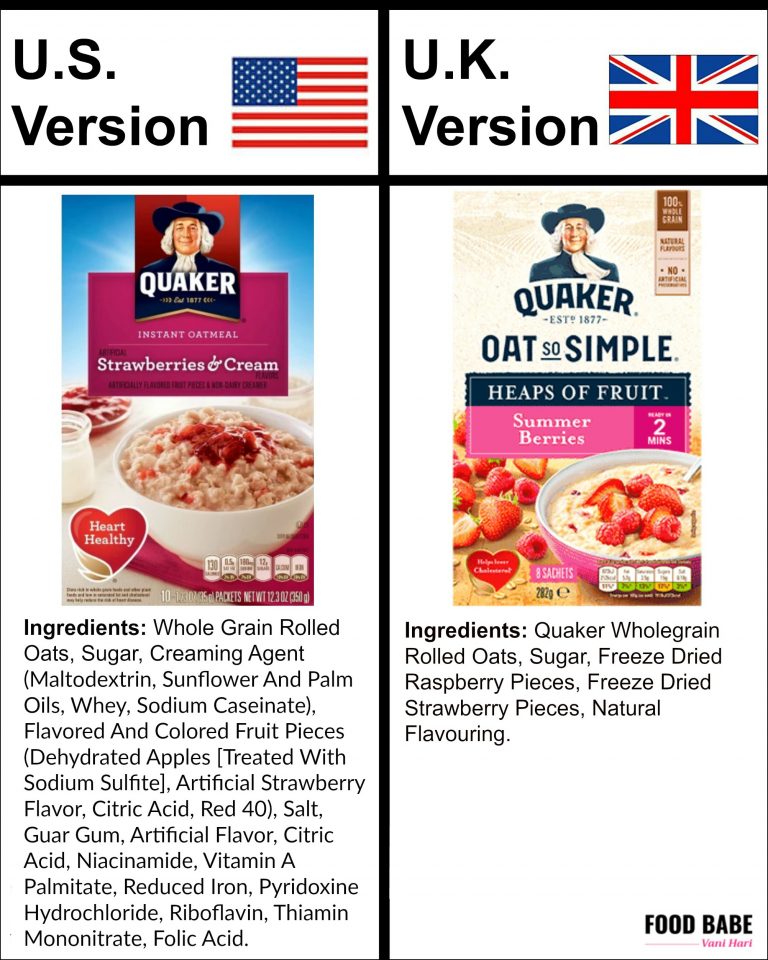Photos from FoodBabe.com
When a family member visited the doctor’s office to address some stomach problems, her doctor passionately advised her to start shopping at Aldi. Why? Because Aldi follows the European standard for food by stocking items without harmful additives. The doctor then went into a rant about how America allows harmful chemicals in our food when it can be produced without it. I was shocked. I couldn’t wrap my head around the fact that the United States is knowingly allowing people to consume harmful additives. This news sent me down a rabbit hole of food research that made my stomach churn.
According to the New York Times, the European Union and Great Britain prohibits many food additives and various drugs that are widely used in American foods, including drugs used on animals and the import of genetically modified foods. In Oct. 2018, the FDA agreed to ban six artificial flavoring substances. However, the FDA insisted that the artificial flavors “‘do not pose a risk to public health,’ but concedes that the law requires it not to approve the food additives.” Shockingly, food companies were given at least two years to remove them from their products, meaning we could still be consuming some of these harmful substances today.
One of these harmful substances banned in 2018 was Potassium bromate and azodicarbonamide (ADA) which is often added to baking products. The International Agency for Research on Cancer labeled it as a possible human carcinogen, and the Center for Science in the Public Interest petitioned the FDA to ban it 20 years ago, proving that the history of America’s food exploits has been years in the making. Americans pay for dangerous food and expensive medical bills that result from the harmful contaminants they unwittingly have consumed their entire lives. Obesity has increased because of the junk food and overconsumption the United States encourages, and weight loss companies have emerged to take advantage of a growing market. This seems like a never-ending cycle of profit made from exploiting innocent people.
It is not as if food production depends on harmful additives. The consumption policies present in many countries around the world prove that food can be produced at a reasonable cost without dangerous ingredients.
Food activist Vani Hari, creator of Food Babe, the blog and book that made her famous for exposing what really lies in the American food supply, shared a label comparison of products made in the United States and in Europe. It proved that many food companies are selling similar products with healthier ingredients overseas.
Take Heinz Tomato Ketchup, for example. Food Babe found that “Heinz ketchup is GMO-free in the U.K. but full of GMOs and High Fructose Corn Syrup in the U.S., along with lab-produced ‘natural flavoring’ that helps create an addiction to their product.” The Betty Crocker Red Velvet cake is another example. The American version contains artificial colors linked to food cravings and obesity as well as trans-fat, which has been shown to increase the risk of heart disease. More companies like Kraft, Kellogg’s, McDonald’s, Pepsi, General Mills and Quaker produce safer products overseas but continue to sell unhealthier versions to Americans.
Why do companies do this? Many food activists believe, as do I, that American food has been designed to increase profits at the expense of public health. 100 Days of Food, a popular and informative food activism blog, believes that it is the food industry that is controlling the narrative for nutrition and wellness and that “the government has their hands tied by big food industry and chemical company lobbyists that basically control what the FDA approves, deems safe for human consumption and our overall food policy.”
If we are what we eat, I don’t think Americans are doing so hot. It seems as though we can’t trust or rely on our government to advocate for us so it is up to us as individuals, uniting to enact change. Altering the state of the American food industry starts with active political participation. Write to your representatives. Sign petitions. Annoy the food companies. Spread the word and maybe we can achieve, little by little, the quality of food we as human beings deserve.
Maria Marabito is a third year English major with a minor in literature and diverse cultures. MM883631@wcupa.edu.


[…] Click here to view original web page at wcuquad.com […]